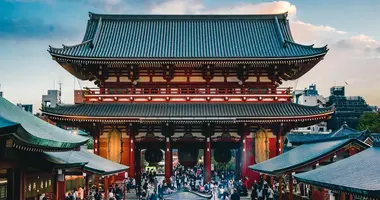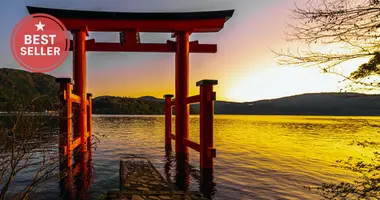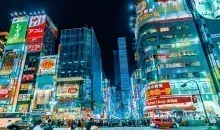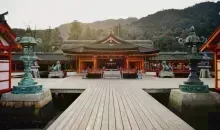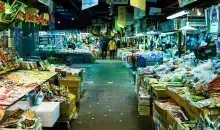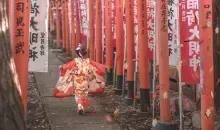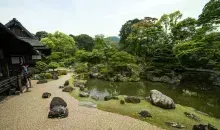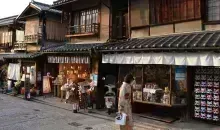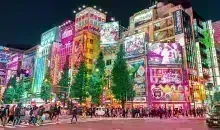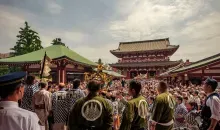Azabu Guide: Discovering Tokyo's Prestigious International Neighborhood
- Published on : 28/07/2024
- by : Japan Experience
- Youtube

Moto-Azabu with Moto-Azabu Forest Hills Tower (right) and Roppongi Hills (center distance)
Nestled in the heart of Tokyo's Minato ward, Azabu stands as a testament to the city's blend of tradition and modernity. This prestigious neighborhood, known for its high-end residential properties and international community, offers a unique glimpse into Tokyo's cosmopolitan lifestyle. From its narrow, cobblestone streets lined with century-old shops to its modern, luxurious apartments, Azabu presents a fascinating juxtaposition of old and new Japan. Whether you're a diplomat, an expatriate, or a curious traveler, Azabu's charm lies in its ability to offer a taste of home while immersing you in Japanese culture.
Overview of Azabu: A blend of tradition and modernity
Azabu is a microcosm of Tokyo's unique character, where traditional Japanese elements seamlessly intertwine with contemporary influences. This upscale district, located just south of Roppongi, is renowned for its diplomatic presence, high-end residences, and international atmosphere. The area is divided into several distinct neighborhoods, including Moto-Azabu, Nishi-Azabu, and the famous Azabu-juban.
One of Azabu's most striking features is its topography of gentle hills and winding streets, offering a refreshing contrast to Tokyo's typically flat landscape. This unique layout contributes to the area's charm, with hidden gems tucked away in unexpected corners. As you explore, you'll find a mix of traditional Japanese houses, modern high-rises, and everything in between, creating a visually diverse and intriguing streetscape.
The heart of Azabu's community life centers around the Azabu-Juban shopping street, a vibrant thoroughfare that perfectly encapsulates the area's blend of old and new. Here, centuries-old family-run businesses coexist with trendy cafes and international brands, creating a unique shopping and dining experience. This street is also home to the popular Azabu-Juban Noryo Festival, held annually in late August, which draws crowds with its food stalls, performances, and lively atmosphere.
Azabu Post Office
Historical significance and evolution of Azabu
The history of Azabu is deeply intertwined with the broader narrative of Tokyo's development. Dating back to the Edo period (1603-1868), Azabu was initially an agricultural area known for its production of hemp cloth, which is reflected in the kanji characters of its name (麻布, literally meaning "hemp cloth"). However, the area's destiny changed dramatically with the establishment of the Tokugawa shogunate in nearby Edo (present-day Tokyo).
During the Edo period, Azabu transformed into a residential district for samurai and daimyo (feudal lords). Its proximity to Edo Castle made it a desirable location for these elite families. This period saw the construction of several important religious sites, including Zenpuku-ji Temple, founded in 824 AD, which would later play a significant role in Japan's international relations.
The Meiji Restoration of 1868 marked another turning point in Azabu's history. As Japan opened up to the world, Azabu began its transformation into a diplomatic hub. In 1859, Zenpuku-ji Temple housed the first United States delegation in Japan, setting the stage for Azabu's future as a center for international relations.
The post-World War II era saw Azabu emerge as a premier residential area, attracting affluent individuals and families seeking a luxurious and secure lifestyle. The influx of foreign embassies in Japan further solidified Azabu's international character, making it a favorite among diplomats and expatriates.
Today, Azabu stands as a symbol of Tokyo's internationalization, offering a unique blend of traditional Japanese charm and cosmopolitan sophistication. Its evolution from an agricultural outpost to a global residential hub mirrors Tokyo's own journey from feudal capital to world-class metropolis.

Exploring Azabu's distinct areas: Moto-Azabu, Nishi-Azabu, and Azabu-Juban
Azabu is composed of several distinct areas, each with its own unique character and attractions. Let's explore the three most prominent neighborhoods: Moto-Azabu, Nishi-Azabu, and Azabu-Juban.
Moto-Azabu: A quiet and elegant residential enclave
Moto-Azabu, meaning "Original Azabu," is the oldest part of the Azabu district. This area is characterized by its quiet, tree-lined streets and elegant residential properties. It's a favorite among diplomats and high-ranking executives due to its proximity to many embassies and international schools.
One of the most notable landmarks in Moto-Azabu is the Moto-Azabu Forest Hills Tower, a luxury residential complex that stands out with its distinctive architecture. The tower offers panoramic views of Tokyo, including the nearby Roppongi Hills complex.
Moto-Azabu is also home to the historic Zenpuku-ji Temple, Tokyo's second oldest temple. Founded in 824 AD by Kukai, the founder of the Shingon sect of Japanese Buddhism, this temple played a significant role in early U.S.-Japan relations. It's also the final resting place of Fukuzawa Yukichi, one of Japan's most influential modernizers and the founder of Keio University.
Nishi-Azabu: A hub of international cuisine and nightlife
Nishi-Azabu, or "West Azabu," is known for its vibrant dining scene and nightlife. This area seamlessly blends high-end residential properties with a diverse array of restaurants, bars, and cafes. It's a popular spot for both locals and expatriates looking for a night out.
The area is particularly famous for its international cuisine, with restaurants offering everything from authentic Italian and French dishes to innovative fusion concepts. Many of these establishments are housed in converted traditional Japanese houses, adding to the unique dining experience.
Nishi-Azabu is also home to several embassies, including the Swiss Embassy, the Greek Embassy, and the Ukraine Embassy, further contributing to its international atmosphere.
Azabu-Juban: The heart of Azabu's community life
Azabu-Juban is perhaps the most famous and lively part of Azabu. Centered around the Azabu-Juban shopping street, this area offers a perfect blend of traditional Japanese charm and modern convenience.
The Azabu-Juban shopping street is the neighborhood's main attraction, lined with over 300 shops, many of which have been in business for over a century. Here, you can find traditional Japanese confectioneries, artisanal crafts, and modern boutiques side by side. The street is also home to numerous cafes and restaurants, making it a popular spot for both shopping and dining.
One of the highlights of Azabu-Juban is the annual Azabu-Juban Noryo Festival, held in late August. This lively summer festival features food stalls, traditional performances, and attracts large crowds of both locals and tourists.
Azabu-Juban is also known for its unique architectural blend. Many buildings in the area, including global chain stores, have been designed to fit in with the traditional aesthetic of the neighborhood, creating a harmonious streetscape that respects the area's heritage.
Living in Azabu: High-end residential properties and international community
Azabu has long been one of Tokyo's most desirable residential areas, particularly among the city's international community. The neighborhood offers a range of high-end housing options, from luxurious apartments in modern high-rises to spacious detached houses with gardens - a rarity in central Tokyo.
The real estate market in Azabu is known for its premium prices, reflecting the area's prestige and desirable location. Properties here often come with high-end amenities and security features, catering to the needs of diplomats, executives, and affluent families.
One of the key attractions for international residents is the presence of several international schools in and around Azabu. These include the American School in Japan's Early Learning Center and Nishimachi International School, making Azabu an ideal location for expatriate families with children.
The international character of Azabu is further reinforced by the numerous embassies in the area. You'll find the diplomatic missions of countries like Germany, France, Pakistan, and many others, contributing to a diverse and globally-minded community.
Living in Azabu offers a unique blend of Japanese culture and international influences. Residents can enjoy traditional Japanese experiences, like visiting local temples or participating in seasonal festivals, while also having access to familiar comforts from home, such as international supermarkets and Western-style cafes and restaurants.
Things to do in Azabu: Cultural attractions and local experiences
Despite its relatively small size, Azabu offers a wealth of activities and attractions for both residents and visitors. Here are some of the top things to do in this vibrant neighborhood:
Explore the Azabu-Juban Shopping Street
The Azabu-Juban shopping street is the heart of the neighborhood and a must-visit destination. Stroll along the cobblestone streets and explore the mix of traditional Japanese shops and modern boutiques. Don't miss the chance to try some local specialties, like taiyaki (fish-shaped cakes filled with sweet bean paste) from Naniwaya Sohonten, a shop that's been in business since 1909.
Visit Zenpuku-ji Temple
Zenpuku-ji Temple is not only one of Tokyo's oldest temples but also a site of significant historical importance. Take a moment to admire the temple's architecture and peaceful grounds. Don't miss the ancient ginkgo tree, which is over 700 years old and survived bombing during World War II.
Relax in Arisugawa-no-miya Memorial Park
Located in Minami-Azabu, the Arisugawa-no-miya Memorial Park offers a tranquil escape from the city bustle. This former feudal lord's residence features beautiful walking trails, a pond, and is particularly stunning during cherry blossom season. The park is also home to the Tokyo Metropolitan Central Library, which houses an extensive collection of foreign language books.
Experience the Azabu-Juban Noryo Festival
If you're visiting in late August, don't miss the Azabu-Juban Noryo Festival. This lively summer event features food stalls, traditional performances, and games, offering a perfect opportunity to experience Japanese festival culture.
Take a Dip at Azabu-Juban Onsen
For a truly local experience, visit the Take-no-Yu Onsen, a century-old public bathhouse. The dark brown water, rich in minerals, is said to have rejuvenating properties. It's a great way to relax and immerse yourself in Japanese bathing culture.
Admire the View from Moto-Azabu Hills
While not open to the public, the Moto-Azabu Hills complex offers stunning views of the Tokyo skyline, including Tokyo Tower. Even from street level, the impressive architecture of this luxury residential complex is worth admiring.
Dining and shopping in Azabu: From traditional to contemporary
Azabu is a food lover's paradise, offering a diverse range of dining options from traditional Japanese cuisine to international flavors. The shopping scene is equally varied, with everything from century-old family businesses to modern boutiques and international brands.
Dining Highlights:
- Azabu Juban Sushi: For an authentic sushi experience, visit one of the many high-quality sushi restaurants in Azabu-Juban.
- Azabu Torisei: A popular yakitori (grilled chicken skewers) restaurant that's been serving locals for decades.
- Café La Bohème: A trendy café offering a fusion of Italian and Japanese cuisine, perfect for a casual meal or coffee break.
- Ushigoro Bambina: An upscale yakiniku (Japanese BBQ) restaurant known for its high-quality wagyu beef.
- Naniwaya Sohonten: Famous for its taiyaki, a fish-shaped cake filled with sweet red bean paste.
International Cuisine:
Azabu's international community is reflected in its diverse restaurant scene. You can find authentic Italian trattorias, French bistros, American-style diners, and various Asian cuisines throughout the neighborhood.
Shopping Highlights:
- Azabu-Juban Shopping Street: The main shopping area, featuring a mix of traditional shops and modern boutiques.
- Nissin World Delicatessen: An international supermarket offering a wide range of imported goods.
- Kagurazaka Street: While technically in neighboring Shinjuku, this picturesque street is within walking distance and offers a range of traditional Japanese goods.
- Roppongi Hills: Just a short walk from Azabu, this complex offers high-end shopping and dining options.
Traditional Crafts:
Don't miss the opportunity to explore shops selling traditional Japanese crafts. You can find stores specializing in items like washi (Japanese paper), traditional textiles, and handcrafted ceramics.
Transportation and accessibility in Azabu
Despite its quiet residential character, Azabu is well-connected to the rest of Tokyo through various transportation options:
Subway Stations:
- Azabu-Juban Station: Served by the Tokyo Metro Namboku Line and the Toei Oedo Line, providing easy access to other parts of Tokyo.
- Roppongi Station: A short walk from parts of Azabu, served by the Tokyo Metro Hibiya Line and the Toei Oedo Line.
- Hiroo Station: On the Tokyo Metro Hibiya Line, convenient for residents of Minami-Azabu.
Bus Services:
Several bus routes run through Azabu, connecting it to other parts of central Tokyo. These can be particularly useful for reaching areas not directly served by the subway.
Taxis:
Taxis are readily available in Azabu, especially around major intersections and stations. They provide a convenient option for door-to-door travel, particularly late at night.
Walking and Cycling:
Azabu's hilly terrain and narrow streets make it an interesting area to explore on foot. While cycling can be challenging due to the slopes, it's still a popular option for short trips within the neighborhood.
Access to Major Areas:
- Roppongi: 5-10 minutes by foot or a short bus ride
- Shibuya: About 15 minutes by subway
- Tokyo Station: About 20 minutes by subway
- Haneda Airport: About 40 minutes by train or taxi
- Narita Airport: About 90 minutes by train or taxi
Azabu's central location and good transport links make it an ideal base for exploring Tokyo, combining the tranquility of a residential area with easy access to the city's major business, shopping, and entertainment districts.
















